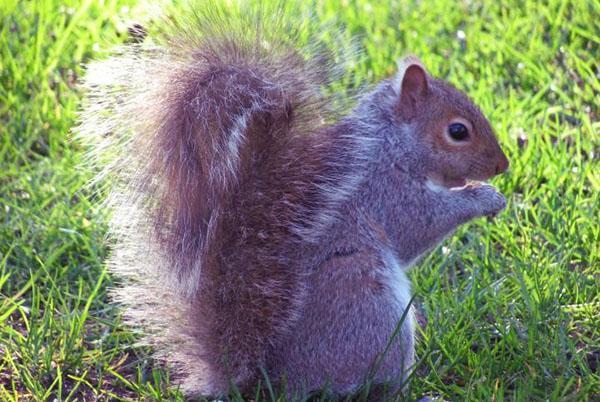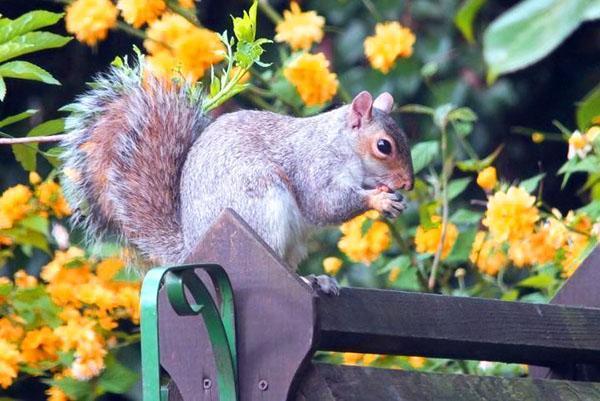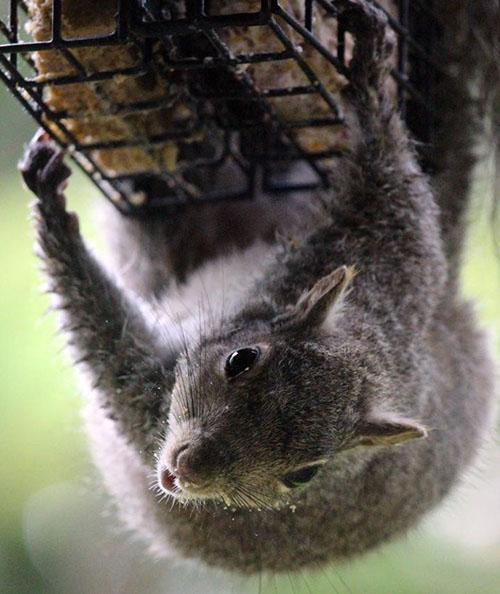How to deal with squirrels in the garden
 In this article, we will talk about how to identify and get rid of squirrels in your suburban area, because they can bring a lot of problems. Seemingly cute and harmless animals often turn out to be a real misfortune.
In this article, we will talk about how to identify and get rid of squirrels in your suburban area, because they can bring a lot of problems. Seemingly cute and harmless animals often turn out to be a real misfortune.
Why you should worry about proteins

During this period of time, it is especially active. Animals do not hibernate, which is why their underground storerooms are vital winter storage areas. Squirrels have an instinct for stockpiling that helps them survive. Little rascals hide food, burying it everywhere on their territory.
Although there are several species of squirrels in North America, it is the gray squirrel that brings so much trouble to gardeners (and people who raise birds). How do these resourceful pests find bulbs? Why are they terrorizing some areas and not touching others? What do they eat?
Squirrels usually collect nuts, acorns, pine cones, bark, fruits, berries, mushrooms and insects, but not bird eggs and bulbs. Sometimes they spoil flowers just for fun. Stay tuned for these unexpected guests and try a few of our tips to get rid of them.
How to identify a squirrel in the garden
 Most often, it is the gray squirrel that is nasty in your garden. It weighs about a pound, and its coat color ranges from gray to dark brown and black. On the chest, the fur is light. The body length reaches 25 cm, the same is occupied by the fluffy tail - a famous feature of the squirrel. The luxurious fur layer is used for warmth, communication and balance.
Most often, it is the gray squirrel that is nasty in your garden. It weighs about a pound, and its coat color ranges from gray to dark brown and black. On the chest, the fur is light. The body length reaches 25 cm, the same is occupied by the fluffy tail - a famous feature of the squirrel. The luxurious fur layer is used for warmth, communication and balance.
Squirrels have a very keen sense of smell, which allows them to dig up bulbs unmistakably. The nose of these skilled thieves is a very small but extremely powerful tool for finding nuts and berries. Gardeners aren't sure if squirrels are purposefully digging up onions, but the problem is real and widespread.
As we mentioned, if you find that the spring bulbs are ripped open, you are dealing with squirrels or chipmunks. They love to do this during autumn feeding, eating onions and using the holes to store their nuts.
Squirrels also empty bird feeders. If you notice that the food is disappearing too quickly, it is likely that fluffy rodents have made it to your area.
How to get rid of protein
 Try to keep orange and lemon peels during the winter. Put them in the freezer, and in the spring, dig them into the ground in the right places. This will discourage pests from digging.
Try to keep orange and lemon peels during the winter. Put them in the freezer, and in the spring, dig them into the ground in the right places. This will discourage pests from digging.
You can throw dog hair or human hair around the garden. One farmer shared his experience: “I used to have a problem with the proteins digging up my bulbs. Now, once in the spring and once in the fall, I ask my hairdresser to put together a large hair pack for me and then mix the hair with earth. Squirrels cannot stand the human smell and go to feed on other territories. "
Blood meal scattered over the beds is also an effective way to fight. The coffee grounds have the same effect, discouraging pests from digging the ground.
Do not try to catch and transport squirrels to release them further. This is notoriously a losing strategy, as the population of fluffy nut eaters is extremely large. In addition, if the animal is a female, there is a chance that you will remove it from the young, whose survival depends entirely on the mother.
Preventive measures
 Do not draw attention to newly buried bulbs by leaving peel residues on the surface. Clean up after yourself completely, and do not place the bow on the ground while digging the planting holes. Squirrels smell their favorite smell from afar and rush right there.
Do not draw attention to newly buried bulbs by leaving peel residues on the surface. Clean up after yourself completely, and do not place the bow on the ground while digging the planting holes. Squirrels smell their favorite smell from afar and rush right there.
Want to keep pests away from bird feeders? Place them about 180 cm above the ground and at least 3 meters from trees and buildings (squirrels can jump this distance, and sometimes even further).
Bury a few cloves of garlic near the spring bulbs. You can also apply garlic powder or cayenne pepper to the area around the plantings when the plants enter the flowering phase. The smell should scare off the squirrels.
Loose soil is tempting to dig, so pack the soil well after completing the work.
Wire mesh is another powerful method. Surround the onion planting with this protection. Plants can easily grow through the wire, but the proteins won't reach the bulbs. Also, consider planting crops that pests don't like: daffodils, muscari, allium, and snowdrops.
Squirrels love tulips and crocuses, so it's best not to plant these flowers, knowing that fluffy animals have appeared in the garden.
Now you know that cute animals that we love to feed in the park from our hands can be a real misfortune in summer cottages. Following our advice, you can get rid of them, or coexist side by side and be calm about your plantings.